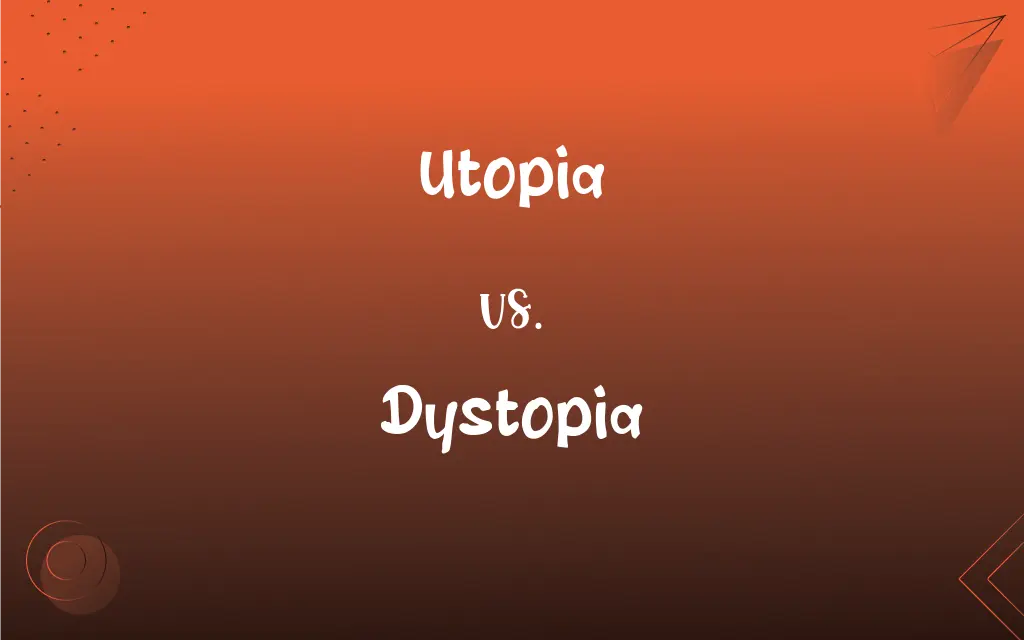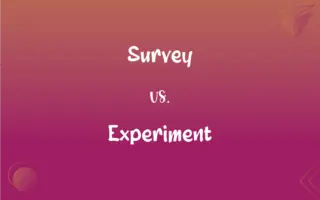Utopia vs. Dystopia: What's the Difference?
Edited by Harlon Moss || By Janet White || Published on November 29, 2023
Utopia is an idealized, perfect society, while dystopia is a flawed, oppressive society often under tyrannical rule.

Key Differences
Utopia represents an ideal world, a society where harmony, peace, and perfection are the norms. It is a concept of a perfect society, free from suffering and human misery. In contrast, dystopia depicts a frightening world, characterized by oppression, suffering, and extreme imperfections, often under authoritarian or totalitarian governments.
In utopian societies, social, political, and moral aspects are designed to ensure the maximum well-being of its citizens. It is a place of idealized equality and justice. Conversely, dystopian societies exhibit extreme inequalities, injustice, and often a loss of individual freedom, reflecting the worst possible outcomes of societal development.
The concept of utopia often involves advanced technology used for the betterment of society, fostering a sense of unity and contentment among its inhabitants. Dystopia, on the other hand, portrays technology as a tool for control and surveillance, contributing to the misery and subjugation of people.
Utopian narratives typically focus on the positive aspects of human nature, emphasizing cooperation, peace, and collective well-being. In stark contrast, dystopian narratives highlight the darker sides of human nature, such as greed, corruption, and the abuse of power.
The idea of utopia serves as an aspirational model for society, encouraging progress and improvement. Dystopia serves as a warning, highlighting the potential dangers and negative consequences of flawed social and political structures.
ADVERTISEMENT
Comparison Chart
Societal Ideal
Perfect, harmonious society
Oppressive, flawed society
Government
Benevolent or non-existent
Authoritarian or totalitarian
Individual Freedom
Promoted and protected
Restricted or eliminated
Technological Use
For societal betterment
For control and surveillance
Narrative Focus
Human cooperation and peace
Human suffering and control
ADVERTISEMENT
Utopia and Dystopia Definitions
Utopia
An idealized world that exists only in imagination.
His utopia is a world without war or conflict.
Dystopia
A fictional society characterized by human misery and oppression.
The novel's dystopia is a world where freedom of speech no longer exists.
Utopia
A conceptual perfect society, often unattainable.
Artists often depict utopia as a place of abundant nature and happiness.
Dystopia
An imagined state where everything is unpleasant or bad.
In this dystopia, citizens are constantly monitored by the government.
Utopia
A representation of an ideal world in literature or art.
The film portrayed a futuristic utopia powered by clean energy.
Dystopia
A society that is the opposite of a utopia.
The film depicts a dystopia ravaged by environmental disasters.
Utopia
An imagined place of perfect social, political, and moral aspects.
The novel describes a utopia where everyone lives in harmony.
Dystopia
A cautionary tale of a society gone wrong, often in futuristic settings.
The dystopia in her story is a result of unchecked technological advances.
Utopia
A society with ideal living conditions for all its members.
In her utopia, there is no poverty or injustice.
Dystopia
A world where societal norms are turned into their worst form.
The story unfolds in a dystopia where the rich exploit the poor mercilessly.
Utopia
Often Utopia An ideally perfect place, especially in its social, political, and moral aspects.
Dystopia
An imaginary place or state in which the condition of life is extremely bad, as from deprivation, oppression, or terror.
Utopia
A work of fiction describing a utopia.
Dystopia
A work describing such a place or state
"dystopias such as Brave New World" (Times Literary Supplement).
Utopia
An impractical, idealistic scheme for social and political reform.
Dystopia
A vision of a future that is a corrupted (usually beyond recognition) utopian society.
Utopia
A world in which everything and everyone works in perfect harmony.
Dystopia
A miserable, dysfunctional state or society that has a very poor standard of living.
Utopia
An imaginary island, represented by Sir Thomas More, in a work called Utopia, as enjoying the greatest perfection in politics, laws, and the like. See Utopia, in the Dictionary of Noted Names in Fiction.
Dystopia
(pathology) Anatomical tissue that is not found in its usual place.
The patient suffers from adrenal dystopia.
Utopia
Hence, any place or state of ideal perfection.
Dystopia
State in which the condition of life is extremely bad as from deprivation or oppression or terror
Utopia
A book by Sir Thomas More (1516) describing the perfect society on an imaginary island
Dystopia
A work of fiction describing an imaginary place where life is extremely bad because of deprivation or oppression or terror
Utopia
Ideally perfect state; especially in its social and political and moral aspects
Utopia
A work of fiction describing a utopia
Utopia
An imaginary place considered to be perfect or ideal
FAQs
Do utopias have governments?
If present, governments in utopias are typically benevolent.
What defines a utopia?
A utopia is an imagined perfect society with ideal conditions.
Can a utopia exist in reality?
Utopias are idealistic and not often achievable in reality.
What type of governments do dystopias have?
Dystopias often feature authoritarian or totalitarian regimes.
Do utopias emphasize individual or collective needs?
They focus on collective well-being and harmony.
What defines a dystopia?
A dystopia is an imagined society marked by suffering and oppression.
How is technology portrayed in dystopias?
It's often used for surveillance and control in dystopias.
Are utopian societies diverse?
Ideally, they support diversity and equality for all.
Are dystopias always futuristic?
While commonly futuristic, dystopias can be set in any era.
Do utopias have economic systems?
If present, they usually support equitable resource distribution.
Are dystopias a warning for society?
Yes, they often serve as cautionary tales about societal flaws.
Do dystopias reflect current societal fears?
Often, they mirror contemporary concerns and fears.
Is the concept of dystopia recent?
Dystopian themes have existed in literature for centuries.
Is technology always positive in utopias?
Generally, technology is used for the betterment of society in utopias.
Can utopias have flaws?
Theoretically, utopias are without flaws, but interpretations can vary.
Can utopias turn into dystopias?
In literature, some utopias can devolve into dystopias.
How do dystopias address social issues?
They typically amplify social issues to extreme levels.
What happens to individuals in dystopias?
They often face oppression and a loss of freedom.
Are all utopias peaceful?
They are typically envisioned as peaceful and conflict-free.
Can dystopian societies be reformed?
In literature, reform is possible but often challenging.
About Author
Written by
Janet WhiteJanet White has been an esteemed writer and blogger for Difference Wiki. Holding a Master's degree in Science and Medical Journalism from the prestigious Boston University, she has consistently demonstrated her expertise and passion for her field. When she's not immersed in her work, Janet relishes her time exercising, delving into a good book, and cherishing moments with friends and family.
Edited by
Harlon MossHarlon is a seasoned quality moderator and accomplished content writer for Difference Wiki. An alumnus of the prestigious University of California, he earned his degree in Computer Science. Leveraging his academic background, Harlon brings a meticulous and informed perspective to his work, ensuring content accuracy and excellence.







































































